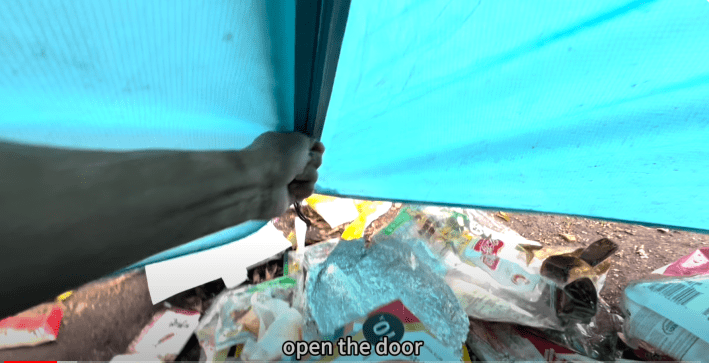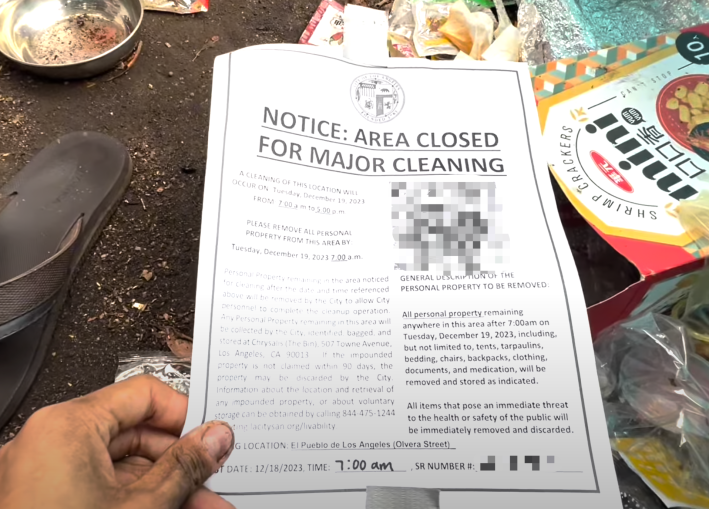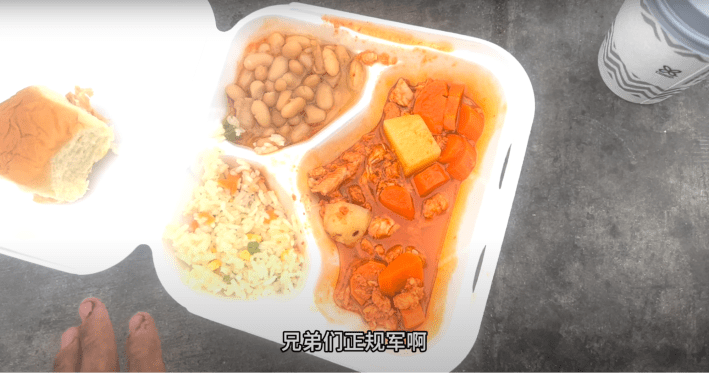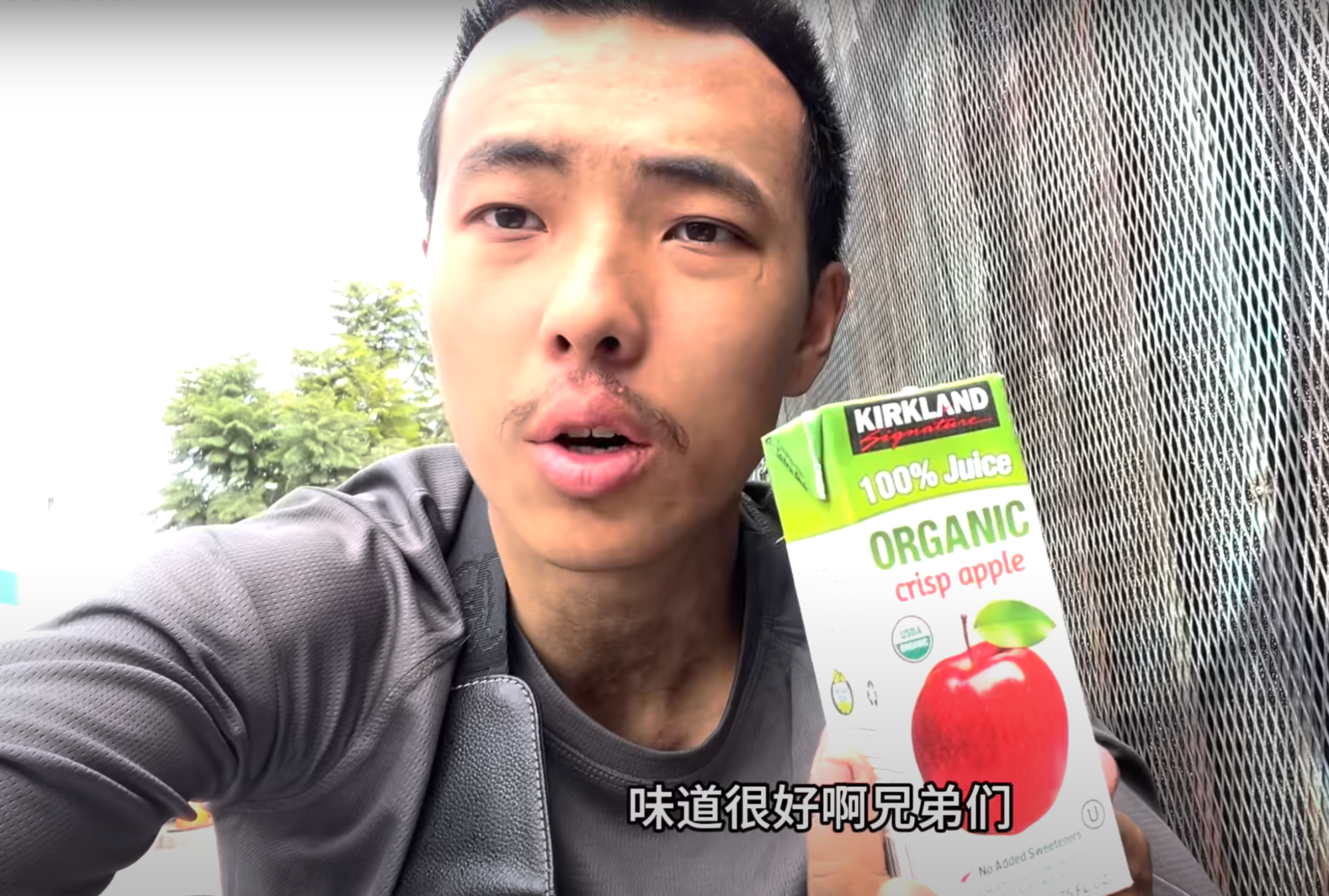Every day, 2 million people on Chinese social media wake up to this catchphrase emanating from a tent in Downtown L.A.
The speaker, known as “Gold-medal lecturer of Fatman Ding Plaza (丁胖子金牌讲师)” or “Prof. Fatman Ding (丁胖子讲师)," is originally from Luzhou, Sichuan, China and has become an unexpected internet sensation.
His “American-style begging (美式要饭)” video journals, posted daily, have amassed nearly 100 million views, making him one of the most viral and controversial figures across the Pacific.
Earlier this year, Prof. Fatman Ding arrived in the U.S., aiming to start his new life at the Fatman Ding Plaza (丁胖子广场) in Monterey Park. Nicknamed after its developer, the plaza is a hub for Chinese newcomers to find resources and communities.
However, reality was a bit hard; Ding found himself embroiled in conflicts with exploitative employers in restaurant and construction gigs. He soon became a know-your-rights influencer, educating other immigrant workers about their rights, which made him persona non grata in the local job market.
No Chinese business owner wanted to give him a job. Blocklisted, he soon found himself having no other choice but to live on the streets, joining L.A. County's other 75,518 unhoused.

His video routine begins with street cleanup theater. He will usually discover a municipal notice plastered on his tent announcing an upcoming cleanup.
The description in Ding's videos are Kafkaesque: “They put a notice on my tent. I move to the other side of the street. They come to do the cleaning. They finish the cleaning, and I come back.” He satirically refers to the weekly cleanup as “room service.”
After throwing away the notice, he will visit the Chinatown branch library to recharge his devices. Then, the real quest begins. Off he goes to the Skid Row area for food.
He begins to work inside the all-inclusive "buffet zone" that is Skid Row. With charities, religious groups, and community organizations distributing on practically every corner, he knows from experience that some lines would lead to a feast, while others—food poisoning. Trialed and tested, he is now an adept food scout, skillfully poking in and out of different lines, sharing the latest info with other waiting comrades, to lock in on the most tasty offer of the day.

As Prof. Fatman Ding walks around, he offers insight into what to look for. “This line for BBQ is getting longer and longer. We will probably never get it. But it smells so good. Just look at the smoke... Wait, everyone is cutting lines. Let’s just go check it out…and dig it into this chicken…I cannot believe it. It has flavors. This is too good.”
“Uhh, they’re giving out free clothes and free phones? Not for me.”
“I heard they’re giving out Chinese food over here… well, if you can even call this Chinese food. Where are the spices?”
“Ugh, this meat tastes like it was plucked from the depths of deep freezers and has been sitting there for years.”
As part of his celebratory shout, whenever he finds food, he yells “I love you!… You’re very gorgeous!... God bless you!” and his trademark phrase, “My brothers! I have found food again! (兄弟们!我又要到饭了!)”
Meaning he did it.
In the man's videos, Skid Row seems to offer everything, except the counseling or housing resources needed to help people exit the cycle of homelessness.
His gastronomic journey last Monday at this open-air charity expo began with a sampling of organic goodies from a Buddhist group, sourced directly from Whole Foods. The haul included salsa, cheese, mandarins, and a bagel. He delighted in a pico de gallo, exclaiming, "I don’t know what it is, but it’s sour and spicy, I love it!"

His journey continued with a snack bag accompanied by Kirkland-branded juice boxes, courtesy of an Islamic community group from the South Bay.
“My fellow brothers. This tastes very good,” he said of the organic apple juice.
He concluded with a hearty curry complete with pinto beans and fried rice, served by a Catholic foundation, to which he complimented, “This is the regular army, the real deal, and you can tell the difference. (正规军就是不一样)”
Then he moved on to the coffee. “I hope it’s not almond flavor. Oh no, it is.”
Beggars can be choosers, and Prof. Fatman Ding proves they can be food critics, too.
"Yes, I’m a picky eater. But that’s just the reality with so many options. I’m human, too. It’s only natural," he says.
Once he was offered some “half-dead” flatbread that tasted like cardboard.
“Look at the trashcan," he noted in his video. "Everybody threw it away. Nobody could eat it. We may be homeless, but we are not stupid."
His daily journaling, presented in a raw, immersive first-person narrative, captures the reality of life with unmatchable rawness. Not even multi-million dollar Netflix documentaries produced by undercover reporters or fully equipped cable news crews can compete with him. He is simply a man on a quest for food, offering honest reviews along the way.
But behind his optimistic expletives and the abundance of food hauls is a poignant contrast: It seems everyone is giving out generosity, but there is no solidarity. The city is spending $845 million to conduct regular outreach, street cleanups, and other services, but at the end of the day, there is no outlet from homelessness because there is simply no home for them to move inro. Those living in tents continue to live in tents.
For his fans on the Chinese internet, some praise him as a robinhood-in-tent, a walking middle finger to a U.S. job market that runs on abusing immigrant labor, and also to the economic system in China that demands everyone to “Nei Juan (内卷),” or compete incessantly among peers.
His gastronomic journey at this open-air charity expo offers a microcosm of the city's broader approach to homelessness. As he navigates the myriad food options provided by charitable organizations, he encounters a diverse array of choices: some are mere gas station snacks, others fresh and palatable, and a few are moldy, seemingly plucked from the "depths of deep freezers."
This variety mirrors the city, where street cleanups run like clockwork, creating an appearance of order and care. Yet, despite this well-oiled machinery of temporary relief, there remains a glaring absence: a sustainable exit from the cycle of homelessness.
For his fans on the Chinese internet, some praise Prof. Fatman Ding as a robinhood-in-tent, a walking middle finger to a U.S. job market that runs on abusing immigrant labor, and also to the economic system in China that demands everyone to “Nei Juan (内卷),” or compete incessantly among peers. He chooses to sleep in a tent halfway across the world, free of rent, and goes to the food expo in Skid Row to feed himself instead.
Others see him as a freeloader and a disgrace to the Chinese American community. There is a rumor that some Chinese business owners are teaming up to have him deported from the U.S.
Prof. Fatman Ding is a divisive figure, but there is one thing for certain. He has already made it in L.A. within months of arrival, and he single-handedly smashed every societal expectation of a Chinese immigrant.
He killed the model minority myth and rejected the expectation for newcomers to endure abusive jobs, not as a political statement or to jog identity politics, but simply because that’s who he has always been, a mortal man who loves to live, and tell the truth (“我爱说实话”).
Moving into his “mobile big mansion,” or camper soon, he no longer has to worry about street sweeps or his address listed on Google Maps as a “religious destination,” receiving uninvited fans worldwide.
He said he would still hang around L.A., though. As for his long-term plans for the future, he is taking it one day at a time.






